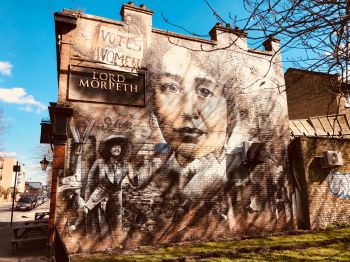Sussex expert on workplace diversity and food studies to help launch exhibition celebrating East End suffragettes
Posted on behalf of: School of Business, Management and Economics
Last updated: Friday, 18 May 2018

Creative Commons: "Lord Morpeth suffragette mural" by Matt Brown is licensed under CC BY 2.0
As part of her work researching the history of the suffragettes in the East End of London, Dr Elaine Swan, Senior Lecturer in Human Resources and Organisational Behaviour at the University of Sussex’s School of Business, Management and Economics, will be speaking alongside other volunteers at the launch of The Women’s Hall, a free exhibition exploring the untold story of Sylvia Pankhurst's radical East London Federation of the Suffragettes (ELFS).
From 30 May until 20 October, the exhibition hall at Tower Hamlets Local History Library and Archives (277 Bancroft Road, London E1 4DQ) will be transformed into a unique space evoking the headquarters of the ELFS, a former Baptist mission hall on Old Ford Road in Bow which the suffragettes named ‘The Women’s Hall’.
The Women’s Hall exhibition is part of a larger partnership project by Tower Hamlets Local History Library and Archives, Four Corners, the East End Women’s Museum, and Alternative Arts, which has been made possible through a Heritage Lottery Fund grant.
As part of this project, Dr Swan has been researching the food activism of the ELFS during the First World War, when the East End suffered from food shortages and starvation. The suffragettes called for the government to distribute food fairly and manage prices, protested on the streets, and shared advice on how to cope with food rationing.
The Women’s Hall was where the ELFS planned their campaigns, protests and welfare services, or what we might call social enterprises today. They called for votes for women but also better wages and working conditions for women in the factories and in domestic service.
The suffragettes also ran a crèche for working women, a co-operative toy factory, several not-for-profit restaurants to feed local families and a weekly newspaper, Women’s Dreadnought, which covered local campaigns but also transnational labour politics. The newspaper employed one of the first black journalists, a Jamaican radical and poet, Claude McKay.
Visitors to the exhibition will learn about these inspirational local working class women through rare photographs, personal objects and archive materials. It will also feature some of the men who supported the suffragettes’ campaigns, including men from many of the local working class unions and local councillors.
Other highlights of the all-day launch event on Saturday 2 June will include crafts, talks, and a guided tour of the exhibition, as well as 'pay-what-you-can' refreshments in a recreation of the suffragettes’ Cost Price Restaurant.
Dr Swan said: “It’s been a privilege to work alongside of the other volunteers and Lauren Sweeney, the volunteer manager for the project. All of us researching this project have been impressed by the radicalism and activism of the working-class suffragettes, of whom less is known [than the predominately middle-class Women’s Social and Political Union (WSPU) led by Emmeline and Christabel Pankhurst].”